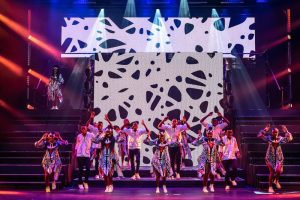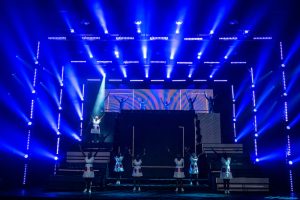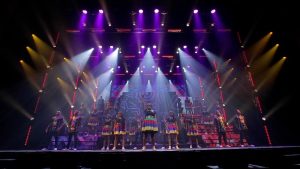It was a proud moment for South Africa as the Ndlovu Youth Choir caused shudders of emotions, the audience rising up to dance, at America’s Got Talent back in June 2019. Little did this youth choir from Limpopo know, many of its member’s orphans living in conditions without electricity or running water, that they would be the vessel to create 170 jobs for the live events industry in South Africa almost two years later at a performance entitled Africa Pulse – Celebrating the Ndlovu Youth Choir, held on 1 May 2021 at Montecasino’s Teatro. All preparations are now in place to enable this production to easily tour across the globe once travel restrictions are lifted and theatres reopen.
Conceptualized and produced by Showtime Management, with the full technical supplied by Gearhouse Splitbeam, Africa Pulse – Celebrating the Ndlovu Youth Choir, is based on the touching real-life story of the choir, who under the direction of Ralf Schmitt, reached international fame, and includes their latest compositions like ‘Hold On’,‘Ungandibulali’ and ‘We will Rise’. The show was made possible through funding granted by the Presidential Employment Stimulus Programme (PESP) under the auspices of the National Arts Council, and while limited wages could be paid to each person on-site, Splitbeam pulled out all stops, generously supplying an abundance of equipment for the show including a grandMA2 control system, Vari-Lite VLZ and VL3000 Spots, Robe lighting, Prolyte Trussing, Clearcom Freespeak, and a DiGiCo SD7 amongst other gear, while also pulling in top designers wanting to be part of this very special project.
“We’ve been fighting, pretty much like everybody else, to survive this pandemic mess we find ourselves in,” said Alistair Kilbee, Managing Director from Gearhouse Splitbeam and Technical Director for the production. “This was the first large scale event Splitbeam had worked on, besides working on the Phantom of the Opera in Asia during the pandemic, and the first time we could get back into a theatre in over a year.”
The project was initiated by Alistair who recalls being in Tawain on Phantom, stuck in quarantine when he first heard about the Presidential Employment Stimulus Programme. “I emailed Hazel Feldman, Director at Showtime Management, and suggested that we put on a show to try and get these funds to help crew and performers,” Alistair describes. With a week to apply, Showtime’s Matthew Counihan, who also directed the production alongside Lesedi Job, and Splitbeam submitted their proposal. “Basically, it was about getting salaries for the staff involved in the project.” In addition, proceeds from ticket sales were allocated to Noah’s Art, a theatre food parcel charity assisting the live events industry.

“The whole point of the production was really about generating some income for people who hadn’t worked for a year,” said Alistair. “They were so excited to be back. Everyone had a great vibe, and the general feeling was that of a family that had been brought back together after being separated for some time. It was really heartwarming to see people who were happy to be doing what they love; happy that they were earning some money, and happy that somebody was thinking about them to call them to do this job.” The staff included everyone from performers to cleaners, technical crew to publicists, the creatives to ushers.
Showtime, however, did not want this to be a once-off production. “The whole point was to design and test a show with the Ndlovu Youth Choir that could tour internationally and as a result, we now have the riders, the technical specs, the Watchout files, the sound files, the lighting programming files, all of which will hopefully generate income for the choir and for technicians in the future. The aim was to create a job that would continue to give back for years to come,” said Alistair. Creatives on the lighting side included Oliver Hauser, Robert Grobler, and Glenn Duncan, all ecstatic to be working back on site! “It was a monster of a show to put on from scratch,” he added. “There was programming through the night, on many nights, and a lot of offline programming because we wanted this to be so spectacular – it made us feel that we achieved something great.”
The future plan is not to have to tour with anything except the costumes, choir and core technical team. “I designed the set out of layered scaffoldings because we can access scaff pretty much all over the world,” said Alistair. “We designed it in a way that LED panels could attach to the structure.” Lighting and audio brands were selected that would also be readily available in most countries. The production basically needs a few external hard drives with the Watchout content file; the lighting programming; the sound QLab plus the rider, and it can basically be staged anywhere on the planet.”
The other brief agreed upon was a show that could go up on a Monday and open on a Tuesday night, allowing short turnarounds in theatres anywhere in the world. “These are all things that make the financial model work for selling a show going forward,” Alistair explains. “The entire show is time-coded and built in such a way that if we change numbers around, we can just move in the time code track and it will all work.” The plan is to take a technical director, lighting designer, sound designer, and possibly an operator on tour with the choir, similarly, to putting on Lord of the Dance or Tap Dogs. “We also do not take along scenery which means we’ve reduced the amount of air freight required and save time. For example, a theatre in London could be set up and the next day the production could play in Berlin. Everything is faster because it’s local equipment”.
Back to the performance in South Africa, and there was a tangible excitement from the artists, audience and crew alike; the show exceptionally well received. “That is why we do what we do. Theatre is all about long hours and hard work driven by our passion and love of the industry. We did this for the love of theatre but at the same time to feed our crews and their dependents as well as our families.”
The audience were a bit subdued to start off with, possibly as they hadn’t been in theatre for over a year. “They came in and it took them a while to get comfortable. We’ve all sat behind a zoom screen for so long that we actually haven’t worked out how to show public emotion,” he says. “But by the end of the first half they were applauding and standing. It proved that people would return to live events or entertainment and theatre when they are allowed to because people need it. They crave it.”
Africa Pulse – Celebrating the Ndlovu Youth Choir was a bitter-sweet production. “There were a lot of people and a lot of tears because everyone felt this emotional thing. There was also the emotional drain of doing something so big for one day, something that we had spent months talking about and planning, and then you had the release of the pressure, the excitement, everything working well and then it was over. And I know that happens with corporate events and large-scale concerts, but in the theatre, we’re used to a much longer period of performance. For us, it was a strange thing that we had put it all up, did it all for a day and then we were out. We were in that venue for eight days, so we put it up, rehearsed it, I mean that’s a brand-new show from scratch, and fully programmed in eight days so it was a big job. I think it looked amazing.”
The big question remains. Should theatres reopen and can we entertain safely? “I honestly feel that theatre has always been a controlled environment. It is so controlled that you can sit there and not mingle with other people. In a restaurant, you are seeing tables full of people and they seem to be safe because they are at their table and not mixing with the others. I think the same can go for theatre. If we can just keep wearing masks, we could easily have 50% capacity in theatres right now and we could actually be making a living because our industry is obviously on death’s door. Everyone is really struggling, and many companies will be facing bankruptcy. I have been speaking to crew recently who are selling furniture now to survive. This is what gets me. These people have made a career out of this industry for 20 to 25 years, for some of them, and now they are in a situation where they have to sell their sofa so that they can eat. Our government needs to understand that our industry needs to reopen… it’s the last industry to remain closed.”












